Check out our shop where you can purchase tours! Learn More
You can learn a lot about Israel’s history in Masada but if you want to learn something about modern-day Israelis, you can also use the supermarket that’s next to your hotel or hostel.
Israelis buy everything from the supermarket – dairy products, meat, fruits and vegetables, bread, beverages, and much more. Usually they won’t buy food for just one meal but enough to last for a couple of days.
Israelis live their live at a quick pace and the goal is to save time.
Israelis don’t have time to spend buying meat at the butcher’s and good vegetables at the grocer’s and a good wine from a wine boutique; they’re in a hurry.
In Tel Aviv and some other places, there is a growing appreciation for quality food and foreign cuisines but we still have a lot to learn from the Italians and the French.
Before I write about what you can usually find in an Israeli supermarket, let’s first talk about what you won’t find in most of them – pork and seafood (except for fish).
Unlike Christianity, which is based on faith and the teachings of Christ, Judaism is a religion of rules.
Most people are familiar with the Ten Commandments, but there are actually 613 rules in the Bible, and throughout the centuries, rabbis have increased the hundreds of rules to thousands of rules. The group of rules that defines what you can and cannot eat is called “Kasherut.” The rules don’t just apply to what you can and cannot eat but also to the way the food is grown, manufactured, prepared, butchered and, served.
Dairy and meat products, for example, are not to be cooked or served together. In a kosher restaurant the steak won’t be cooked in butter and there will be no cheeseburger. There are different degrees of kasherut and different institutions that give out the kosher certificate.
An example: A cow is a kosher animal because it chews on a cud and has split hooves. The butcher has to have special training. The knife must be sharp and smooth and there are still parts in a kosher animal that must not be eaten.
When roasting or salting (salt absorbs the blood), the blood must be removed because blood is forbidden for consumption. The meat must be served on a “meat” plate with “meat” utensils – a plate and utensils that haven’t touched a dairy product. That’s it, in short. Bon appetite!
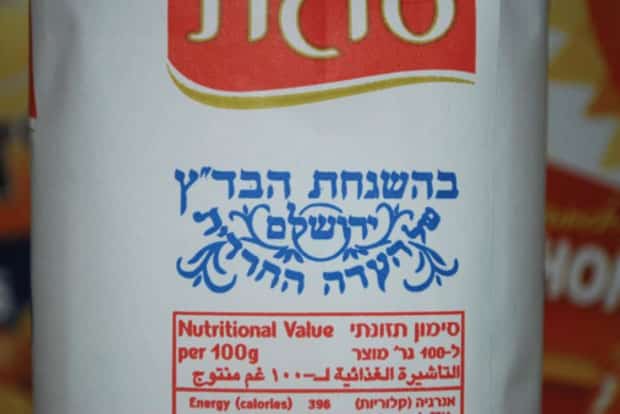
Unlike the rest of the countries in the world in which the agricultural sector is usually considered a conservative sector, in Israel, because of the water and land shortage and the Zionist vision that propelled the Jewish farmers forward, the fusion between agriculture and technology began already in the 1920s.
The greatest achievement to this date was the development of an irrigation system that irrigates whole fields with great efficiency during the dry seasons. Another field of exploration was the development of new fruit and vegetable species of which the most well-known is the cherry tomato.
In the beginning, they wanted to call the little tomatoes “television tomatoes” and market them as a healthy snack for television watchers, but the name didn’t catch on. In the end, they were called cherry tomatoes because of their similarity to cherries.
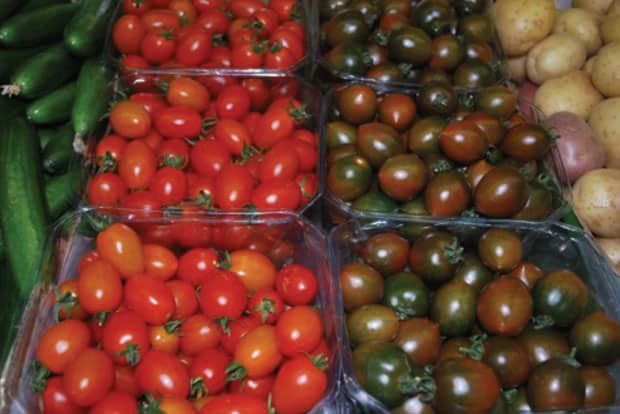
The literal translation is soup almonds but they aren’t almonds at all.
Shkedei Marak were invented in the 1950s from flour and spices. You add them to soup, like croutons.
Unlike the rest of the products here which you’ll probably find under different names in other countries, Shkedei Marak are 100 percent Israeli.
The slogan used in their advertising – “soup is just an excuse” – has become a Hebrew idiom.
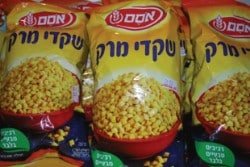
If you hold a survey and ask Israelis which food is the most Israeli, most of them will probably answer Bamba.
You can easily insult Israelis by mentioning that Bamba is just another peanut butter snack, but it is much more than that.
Bamba holds 25 percent of the snack market in Israel, a very impressive achievement by any standards. The name was chosen because it’s easy to pronounce. Bamba is one of the first words that babies can say.
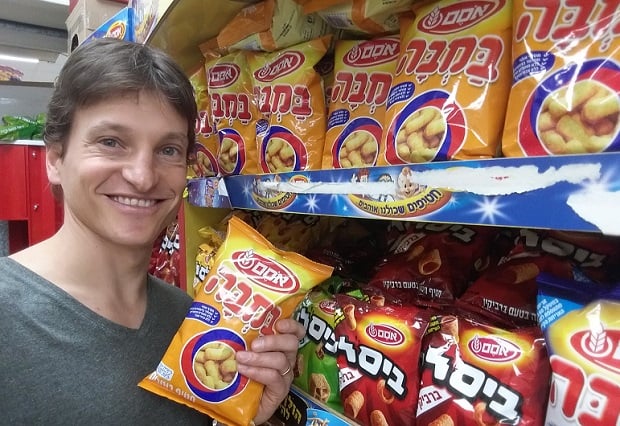
The first time my German girlfriend tasted Bisli, she said it tasted like eating dirt with salt. She might be right but as a child, it was the only reason to go to the birthday parties of children who I didn’t like – Bisli and Coca-Cola, the ultimate combination. Bisli was created by Osem, the same company that invented Ptitim. Because the area of their expertise is pastas, the first Bisli, grill-flavored, was created in the shape of a pasta noodle.
There are some that might say that other Bisli flavors – pizza or barbeque – are better than the grill variety, but they are wrong.
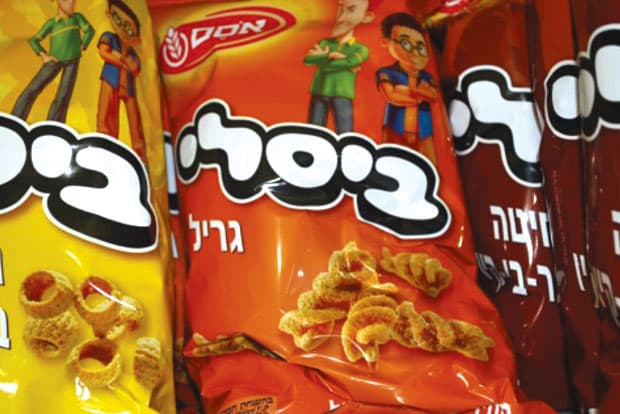
In Israel you don’t slice cheese, you spread it.
The two cheeses that every Israeli household has in their fridge are white cheese and cottage cheese.
The price of cottage cheese was under governmental supervision until 2006. Controls were removed in order to open the market for competition and lower the prices, but ironically, the prices went up.
In 2011, when the price of cottage cheese reached NIS 8 (a 45 percent increase in 3 years), there began a protest on Facebook calling to boycott cottage cheese. The protest swept up more than tens of thousands of Israelis and the “cottage protest” became part of a much larger protest that mostly surrounded the issue of the high living expenses in Israel.
Ever since this protest, the Israeli media, which used to cover mostly political-security issues, covers economic issues more often.
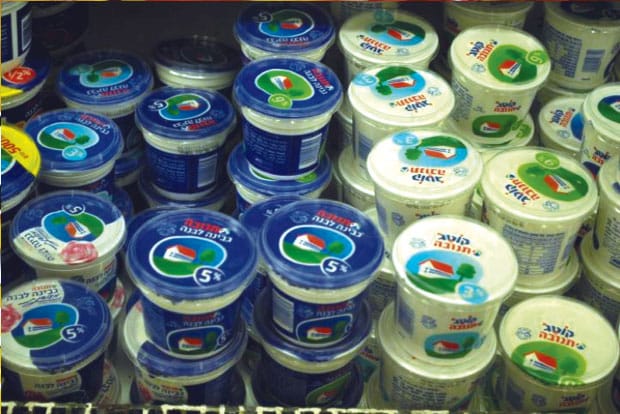
I don’t have a good or interesting story here.
This is simply what you drink in Israel. Coffee machines that make espressos and cappuccinos are slowly entering Israeli kitchens but still, when you say coffee, you usually mean one of these two. Maybe they are so popular because they are quick to make and don’t require any additional tools. All you need is a cup, a spoon, hot water, milk (for Nescafe) and the coffee.
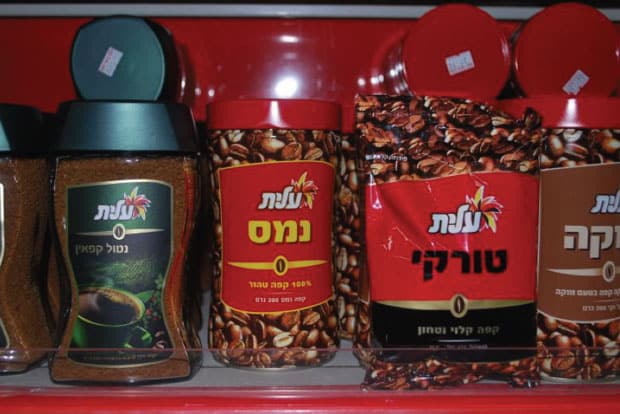
The culture of alcohol is very new in Israel.
In supermarkets, the area that is dedicated to wine, beer, and other alcoholic drinks is smaller than in supermarkets of other countries. Very few people drink beer regularly at home.
The most widely-sold beer in Israel is Goldstar, a lager beer (pilsner), which holds a third of the beer market in Israel. Goldstar will usually be the cheapest beer offered in the pub but its price (as well as the prices of the other alcoholic drinks) is simply outrageous.
In Tel Aviv, the price of a Goldstar in a pub can reach NIS 30 (around 8–9 US dollars).
Find out more things you won’t like in Israel – 10 Things travelers won’t like in Israel

When you look back at the history of Israel, you usually think about wars and emigration.
But one of Israel’s greatest crises occurred in the 1950s – the country almost ran out of food. At times during this decade, there were only enough basic food products in stock for a few days. With this crisis brewing in the background, combined with the huge influx of Jews from Arab countries who were used to eating rice and couscous, Ben Gurion turned to Osem, a large Israeli food company that made pastas, and asked them to create a wheat-based rice substitute.
Osem rose to the challenge by creating “ptitim” – toasted pasta balls. In the early years, it was called “Ben Gurion rice” and outside of Israel it is known as “Israeli Couscous.”
Ptitim is one of the favorite foods of Israeli children. Ptitim, schnitzel, and ketchup are all an Israeli child needs when they come home from school.
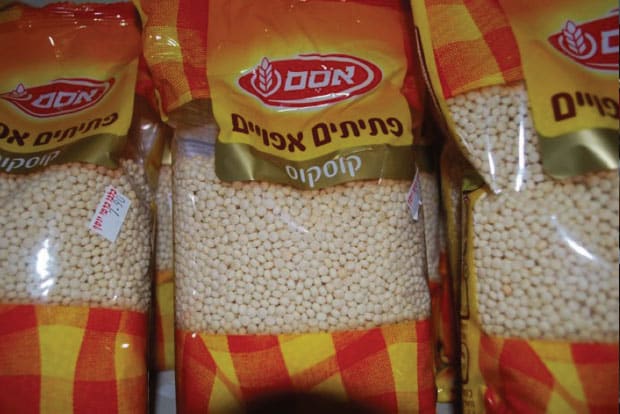
We didn’t invent chocolate milk or nylon bags either but the combination of the two is an original Israeli idea (or maybe not, I’ve heard rumors that there might be chocolate milk in a bag in South America).
For most Israelis, chocolate milk in a bag is a reminder of the summers spent in summer camp. For breakfast we would receive a fresh, empty bun and cold chocolate milk in a bag.
If freedom has a taste, this is it – a bun and chocolate milk.
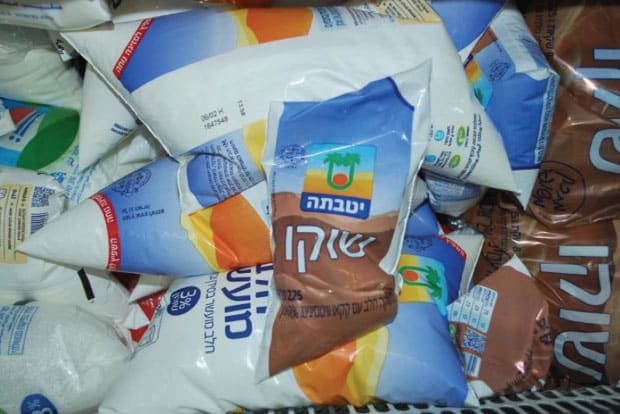
+ Discount Codes
…or as a PDF
©2024 Traveling Israel. All rights reserved. | SITEMAP | TERMS & CONDITIONS